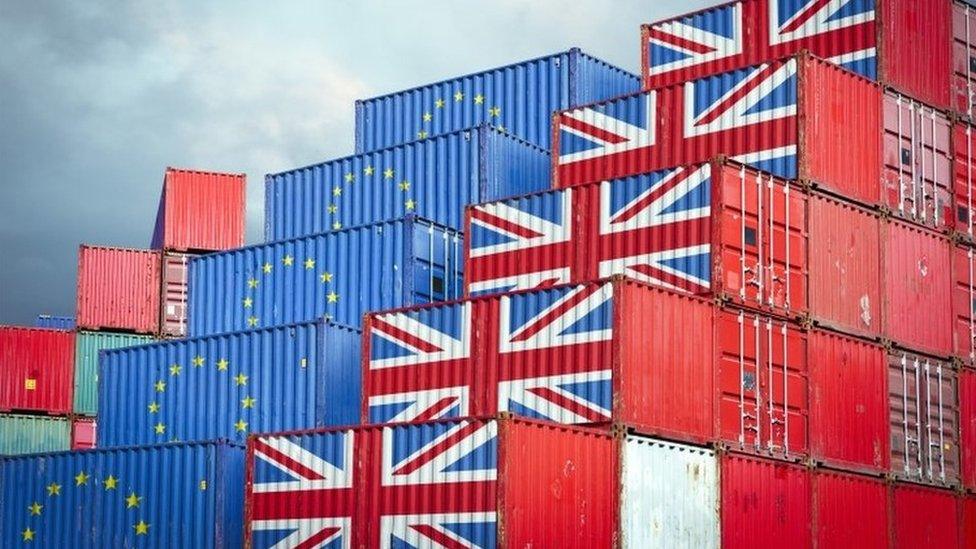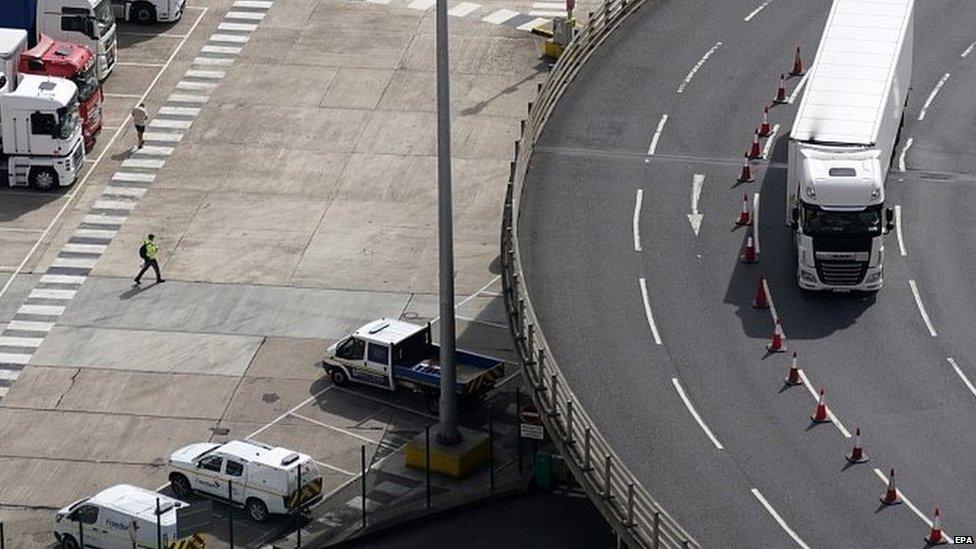Brexit: UK firms 'under-prepared' for new EU trading rules
- Published
- comments

The lack of preparedness among firms for changes to the UK's trading rules with the EU in January is "concerning", a top business group has said.
Research by the British Chambers of Commerce suggests many have not taken key steps to prepare for life outside the EU single market and customs union.
It blamed the coronavirus pandemic and "inconsistent" government messaging.
The government said it would be "intensifying" its engagement with business over the coming weeks.
Amid concerns about the UK's readiness for post-Brexit changes, ministers announced earlier this summer that new checks would be phased in over a six-month period rather than being introduced in one go on 1 January.
And they have made £85m available to help firms deal with new customs declarations, including £50m to recruit an anticipated 50,000 new customs agents, to train them and build new IT systems.
When the current post-Brexit transition period ends on 31 December, businesses will need to complete new formalities when trading with the EU. These include completing customs declarations for imports and exports.
A survey by the British Chambers of Commerce of 480 of its members found that fewer than half of businesses that traded internationally said they had an EORI number - a unique identifier needed to complete customs declarations - despite the government automatically handing these out to traders.
Only 39% said they had checked to see whether they needed to complete customs declarations while just 21% said they had trained staff to deal with the new requirements.
In each case the figures were lower for businesses that trade within the UK.
The findings will add to concerns that the end of the transition period, when the UK will leave the EU's single market and customs union, could lead to significant disruption to UK supply chains.
'Unanswered questions'
Liam Smyth, the British Chamber of Commerce's director of trade facilitation, said business readiness had been hampered by the coronavirus pandemic and the government's "inconsistent approach to communication".
"One of the biggest problems is whether there will be capacity to meet the demand for new customs declarations, which are expected to rise from 55 million to 300 million in just 15 weeks from now," he said.
"Businesses must secure their new customs arrangements now to avoid damaging disruption in January 2021.

"Government must address the unanswered questions that remain around the way businesses move goods, services, people and data in the short time left before the end of the transition period."
Andrew Lawless, the sales director of Phoenix Handling Solutions, a packaging company in Lancashire that imports goods from the EU and Canada, said trying to find the right information could be "frustrating".
Mr Lawless said his company was "doing everything possible," but added: "I do think there is a lack of information because probably like most business owners the goalposts seem to be moving from left to right a little bit."
The company has decided to hire customs intermediaries to deal with the declarations it will have to make under the UK's new trading regime.
Last week, eight groups representing the UK logistics industry wrote to the Cabinet Office minister Michael Gove to raise concerns about the government's readiness for the end of the transition period.
'Chaos in Kent'
The Road Haulage Association issued a fresh warning on Wednesday that scores of lorries risked being turned back from French ports if they did not comply with new customs and VAT rules.
Its chief executive Richard Burnett said the knock-on effects on Channel ports could be severe, telling MPs on the Future EU Relationship Committee there was an 80% chance of "chaos in Kent" early next year.
"If there are insufficient customs agents to be able to process paperwork - and you can't go to a port of exit if you don't have the correct paperwork - then that means businesses are going to stop trading.
"Hauliers may end up putting products on without the appropriate paperwork and will try and get through. In which case what we are going to see is chaos in Kent."
Robert Hardy, operations director at the Customs Clearance Consortium, said he feared many firms would end up being fined for non-compliance.
"People in Kent are worried," said Mr Hardy, who used to run the largest freight clearance facility in the UK at the Port of Dover. "I think it has a huge potential for delays."
A spokesperson for the Cabinet Office said: "The UK's 'new start: let's get going' campaign clearly sets out the actions people and businesses need to take to prepare for the end of the transition period on 31 December 2020.
"Over the coming weeks we will be intensifying our engagement with businesses to ensure that they are well prepared to seize the opportunities that it will bring."